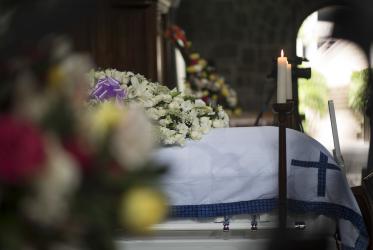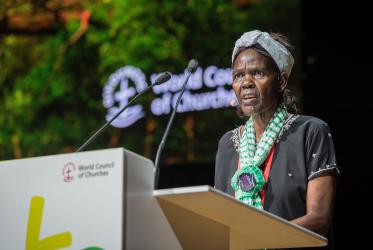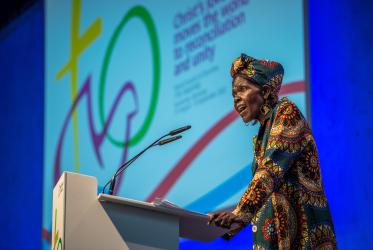We begin our session today with leadership’s sharing landmark developments from and since Busan, South Korea, where the 10th Assembly of the World Council of Churches was held. For my part, I would like to offer a couple of comments about some of the landmarks that we have seen along the way. My remarks will be threefold. First, I'll look at the ecumenical movement, in terms of member churches and the wider movement. Second, I will look at some programmatic issues. And third, I look at governance broadly.
From Busan to Karlsruhe
Let's just cast our minds back and remember that we met in Busan, Republic of Korea, on a peninsula that is still divided. Korea was divided after the Second World War and the Korean War. For our next assembly, we are moving to Germany, which was divided also. But, thank God, we celebrate the grace and the mercies of God that we now go back to Germany as a united country, a country that has really served and supported the ecumenical movement.
This particular aspect—geographically, politically, economically—is critical when we look at our theme, “Christ's love moves the world to reconciliation and unity” and really rethink where our communities are today after many, many conflicts. In terms of the ecumenical movement, particularly the World Council of Churches and its member churches, I like to say that we've seen since Busan and as we move to Karlsruhe a widening and a broadening of an ongoing ecumenical dialogue. We have deepened our bilateral dialogues, which are intercommunion, but we have also broadened the number of groups that we relate to. For instance, in our relationship with the Pentecostal movement and the evangelical movement, we see a much more positive spirit since Busan.
Having said that, let me recollect that in Busan we had a challenge from a small group of evangelicals who were still demonstrating against the WCC as the Antichrist. But, in my opinion, this attitude has actually continued to decline as we have deepened our dialogue with many other groups of Christians. The affirmation from Busan captures what I have just described, and that is: we are committed to move together. We moved together as member churches, and we have moved together with other communions that are not members, like the Catholic Church. And finally, on this particular theme of broadening dialogue, we have seen also a deepening and a much more content-rich interfaith dialogue.
But more importantly, we have moved together with human communities and social movements in addressing issues of justice. Looking again at the Busan motto, we are committed to move together, we can actually go back and see it at work in the Pilgrimage of Justice and Peace. The Pilgrimage of Justice and Peace has offered us a framework for relating. Busan invited member churches, Christians and people of other faiths, and all men and women of good will, to journey together.
And indeed, during the last eight years, the Pilgrimage of Justice and Peace has given us a strategic direction in terms of facilitating coherence and ensuring that we focused together on issues that are clearly human-based, that truly affect the lives of people. Strategically, the pilgrimage has helped us formulate the basic four or five programmatic objectives of the World Council of Churches which have guided our work.
Programmatic reflections
Let me just lift up several landmarks in our programme work that, for me and from a leadership perspective, present us food for thought and continuity.
First, we have seen since Busan a quite coherent, very active, very strong communication unit within the World Council of Churches, and particularly in social media.
People are able to follow the work not only of the council as an organization but of all communities, member churches, and even non-member churches. And this is because the unit of communication has never before been as strong or as agile in acting. And indeed, it is through this active and very creative communication department that, during this pandemic, we've been able to keep together, to pray together, and to work together. Like so many other organizations, we initially saw to our dismay that the pandemic could almost paralyze the work of the World Council of Churches, so we were so happy that through this department we were able to connect with member churches. We were able to harness stories of hope, stories of resilience, stories of patience, stories of innovation.
And as we meet now and seek to move to the 11th Assembly, I dare say that indeed, in this pandemic the churches have proved their resilience. They have proved the need for and the place of intergenerational support, dialogue and fellowship. Because it was the young people who supported the clergy and who helped the elderly in churches to cope with the new technology in order to keep worshiping and nourishing community. In fact, we have seen that the place of communications technology during this period has been very critical. For all its problems and lopsidedness, technology has helped to keep the fellowship and the work of the council alive.
A second programmatic area of achievement I wish to highlight is the Just Community of Women and Men. During this period it has lifted up the issue of Thursdays in Black. Fighting rape and gender-based violence, has been a global matter. But the World Council of Churches, through the Thursdays in Black campaign and movement, has been able to bring in other groups (for instance, secular groups that started in America, such as #MeToo) that were working on the same issues of overcoming gender-based violence. Therefore, for me, a programmatic area that stands as a major landmark of this period is the Just Community of Women and Men. It has proved that together men and women can overcome the challenges, the obstacles, the issues that generate unwanted and ugly violence.
Third, I want to lift up the Conference on World Mission and Evangelism from 2018, held in Africa for the first time. Having already addressed the issues of mission from the margins, in Tanzania we reflected on mission and evangelism in relation to transformative discipleship. To us, it was very important that the place of mission and evangelism in the life of the council and in the life of the movement remain strong and appealing. It is through evangelism, through mission that we are able to change the lives of people by their accepting Christ as the Lord and Saviour of their lives. In this change, a new lifestyle is taken up, a new community is formed, a new value system is adopted, and thus transformative discipleship becomes central.
Fourth, we have seen another programmatic area come up recently, and that is overcoming racism and xenophobia. It has emerged again because, despite all the work that has been done in the past, the demons of racism, the demons of xenophobia, the demons of division continue to dog humanity. We realized that there was a wave all over the world that has really woken up racism and xenophobia against certain communities. This is a programmatic priority that the central committee endorsed and that I think is truly important.
Fifth, let me also look at the issues of unity. Several good publications have been issued, recently, so I will not go into detail. But for me what is important is having linked faith and our other work through the Pilgrimage of Justice and Peace, so that the theology that is now shared with us from the pilgrimage is also reflected in the work of Unity, Faith and Order. To be more specific, I think it is a landmark achievement that the pilgrimage intentionally decided to reflect theologically.
Finally, my comments are not exhaustive of all programmes; but I cannot but mention, as I finish, the place of the Ecumenical Institute Bossey in the formation of future ecumenists and future leaders. Even with the pandemic and then its resurgence, Bossey has been able to function, managing to bring in students from all over the world to overcome the challenges.
Governance during a pandemic
My final point is on governance. The World Council of Church's governance, beginning with the central committee, was of course affected by the pandemic. But, thank God, most people understood the need for us to continue our work online. And the last meeting of the central committee was quite productive online. We have taken decisions online, and for me this points toward a very positive direction. Now of course we are going to meet again online, although we had anticipated meeting in person, and I am sure we will have a fruitful central committee. Executive committee has also conducted its meetings, except for one, online, as has the leadership group.
Now to conclude on governance, through all this and through all the period since Busan, we have seen a spirit of coherence, teamwork, collegiality, and mutual support. I mean, personally, when it comes to the leadership of central committee, I can only say it has been very collegial, very consultative, and very supportive of each other. Together with the Presiding Bishop of the Church of Norway, who was then our general secretary, and now with the acting general secretary, Father Sauca, we have worked very well. For this I want to thank God, and I wish that the next leadership after Karlsruhe will have the same ambience, the same spirit. I, as a moderator, have been greatly supported by my colleagues, without which it would not have been possible to function.
So looking back from Busan to now, I see that our present assembly theme is so relevant for us now, because the pandemic has divided people. It has exacerbated some of the conflicts that were there. Hence the theme of Christ's love, as it moves us to reconciliation and unity, could not have been more inspired, because to me it is divine, it is timely and it sums up all our programmes.
Thank you so much. Let us meet in Karlsruhe.




